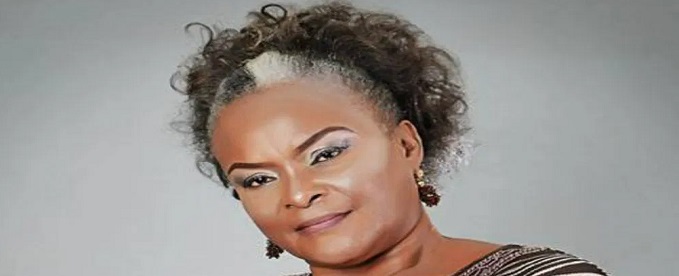Broadcasting
Ify Onwuemene, Nigerian Screen-Goddess Dies of Cancer

Ify Onwuemene, Nigerian actress, has died of cancer, multiple reports from her colleagues have confirmed.

Ify Onwuemene,
The screen-goddess was said to have died on Tuesday after a long battle with endometrial cancer, one of her friends in Nollywood, Gloria Anozie-Young, disclosed.
According to Wikipedia, endometrial cancer is a cancer that arises from the endometrium (the lining of the uterus or womb).
It is the result of the abnormal growth of cells that have the ability to invade or spread to other parts of the body. The first sign is most often vaginal bleeding not associated with a menstrual period.
In a post on her Facebook page, Gloria Anozie-Young said the late actress, who was popular for her role in the famous sitcom Everyday People, had been undergoing treatments at the hospital.
She said in 2019, the deceased underwent eight sessions of chemotherapy after her doctors told her that the cancerous growth had reached stage 4.
“With a deep sense of loss but total submission to God Almighty, we regret to announce that Ifey Onwuemene has gone to be with the Lord.
“Ifey Onwueme was diagnosed with endometrial cancer. Her womb was removed, but she has been battling the ailment for many years now.
“In 2019, even after eight sessions of chemotherapy, the doctors told her she had reached stage 4. However, we are not sure if she was given the wrong diagnosis or being treated with the wrong chemo, because she still felt pains on her upper abdomen and her tummy bloated.
“Ify spent more than N10 million, being helped with donations by her fellow actors and other Nigerians.
“A GoFundme account was opened for her, but it did not yield much.
“She had to go for draining every two weeks at a cost of N280,000 but only 3 litres of liquid can be removed at a time so that her heart is not affected.
“Ifey has finally gone to rest, today, May 25, 2021, may her soul rest in perfect peace. Amen,” the actress posted yesterday.
Broadcasting
Price Hike: DSTV, GOtv Subscribers Threaten Boycott as FCCPC Summons Multichoice

Subscribers in Nigeria have threatened to boycott the services of Multichoice Nigeria, the parent company of satellite television, DSTV and GOtv after a shocking review of their tariff plans by over 20 per cent.

This is coming as the he Federal Competition and Consumer Protection Commission (FCCPC), summoned the PayTV company to explain its proposed subscription price increase.
Recall that in a surprise notification to customers, DSTV on Monday, announced an upward review of their plans effective March 1, 2025.
It is uncertain whether DSTV received regulatory approval to proceed with the upward review which is the second in the last 10 months.
The company reviewed its prices in April last year.
In this fresh development, Multichoice told subscribers that its premium DSTV package has been reviewed to N44,500 from N37,000 and Compact Plus reviewed to N30,000 from N25,000.
DSTV Confam plan was raised from N9300 to N11,000; Yanga and Padi reviewed to N6,000 from N5200, and to N4,000 from N3,600, respectively.
Similarly, the price for GOtv Supa Plus was raised to N16,800 from N15,700; the Supa package reviewed to N11,400 from N9,600; the Max plan was reviewed from N7,200 to N8,500, the Jolli plan was reviewed to N5,800 while Jinja and Smallie were reviewed to N3,900 and N1,900 respectively.
Although Multichoice admitted that consumers were also battling economic challenges, it said it arrived at the decision after “in-depth analysis”.
The decision by DSTV and GOtv has heightened the frustration of subscribers who are still battling with the April 2024 price list.
Ebuka Michael with X handle, @e_bukamichael said, “Nigerians wake up! It is time to boycott Multichoice! We can’t be struggling to feed and still struggle to pay half the minimum wage to watch DSTV. This is extortion and it must stop”.
In a further effort to boycott DSTV subscribers, an aggrieved consumer, @silentwilsn shared “Websites where you can stream football, movies, soap operas, kids’ shows, and even live TV offering everything available on DStv and GOtv for free”.
Other subscribers like Adetokunbo Ademola with X handle, @iamade040482, blamed lawmakers and regulatory agencies for DSTv’s constant upward review.
He lamented, “I don’t blame them ,DSTV. I blame Nigerian lawmakers who give them this chance due to corruption. What exactly is stopping Nigerians from getting ‘pay as you watch’ package?”
FCCPC in reaction, said, “Exercising its mandate under Sections 32 and 33 of the FCCPA, the FCCPC directed the Chief Executive Officer of MultiChoice Nigeria to attend an investigative hearing at the Commission’s headquarters on Thursday, February 27, 2025, according to the statement issued by Ondaje Ijagwu, director, Corporate Affairs on Tuesday, the commission’s summon is in line with its mandate under Sections 32 and 33 of the FCCPA.
“This action follows MultiChoice’s formal notification of the price adjustment, which raises concerns about recurrent unilateral price hikes, potential market dominance abuse, and perceived anti-competitive practices in the pay-TV industry.
“The FCCPC is deeply concerned that Nigerian consumers continue to face frequent price increases, amid accusations that MultiChoice applies different pricing strategies in other markets, heightening questions about fairness and market abuse”.
FCCPC said Multichoice will be sanctioned if found wanted.
“Should MultiChoice fail to provide satisfactory explanations or be found in violation of fair market principles, the FCCPC will be left with no other option than to impose regulatory penalties, sanctions, or other corrective measures to protect Nigerian consumers”, the commission said.
The FCCPC said it is engaging the sector regulator and other relevant agencies to ensure fair competition and consumer protection within Nigeria’s broadcasting and digital subscription landscape.
Broadcasting
MultiChoice Announces Fresh Price Hike for DStv, GOtv Packages

MultiChoice Nigeria has announced an increase in subscription rates for its DStv and GOtv packages, effective March 1, 2025.

In a statement issued to customers on Monday, the company cited the need to maintain the quality of its service as the reason for the price adjustment.
The statement, titled “Price Adjustments for DStv and GOtv Packages,” read, “Dear Customer, please note that effective 1 March 2025, there will be a price adjustment on all DStv packages. This is to enable us to continue to offer our customers world-class homegrown and international content, delivered through the best technology.”
This increase came nearly a year after the company’s last price review, reflecting rising operational costs.
MultiChoice attributed the hike to economic pressures, including the depreciation of the naira and high inflation, which have significantly impacted its business operations in Nigeria.
According to the new pricing structure, the DStv Compact bouquet will rise from N15,700 to N19,000, while the Compact Plus package will now cost N30,000. The Premium subscription will increase to N44,500.
For GOtv subscribers, those on the GOtv Jinja package will now pay N3,900, up from N3,600.
The GOtv Plus package will increase from N4,850 to N5,800, while GOtv Max will now cost N8,500. The GOtv Supa and Supa Plus packages will be priced at N11,400 and N16,800, respectively.
MultiChoice has consistently defended its price adjustments, pointing to economic realities that have made running its services in Nigeria more expensive. The company maintained that the price review is necessary to sustain its offerings and ensure continued access to quality content.
Broadcasting
KongaFM Basks in Rave Reviews from Nigerians

KongaFM -103.7, Africa’s pioneering hit music and commerce radio station, is reshaping the broadcasting space with utter broadcasting professionalism and Nigerians are happy.

With its unique blend of music, advertisements and shopping, KongaFM is winning hearts.
Operating on terrestrial frequencies in Lagos on 103.7 and streaming online for listeners globally at www.kongafm.com, KongaFM has quickly become a favourite among audiences.
Promoters of the station are basking in the rave reviews.
Chris Uwaje, tech policy adviser, global speaker and former president of Nigerian Computer Society (NCS), said described the station as revolutionary.
“Awesome, very incredible and very futuristic entrenurship strategy. I predict very soon, KongaFm will be the numero-uno radio in Africa” he said
Louisa Olaniyi, one of Nigeria’s finest broadcasters simply said “Wow, brilliant”
Bargain hunters and shoppers are also thrilled by genuineness of deals on the station.
Nicholas Isiobi, a shopper said “I am happy with the quality and affordability of the products promoted. It is worth all my while”
Every day, the station kicked off with an exciting mix of hit music, motivational content, and commercial activities, setting itself apart as a trailblazer in the radio industry.
Grace Yusuf, one listener, mentioned how the station has positively impacted her daily routine.
“KongaFM is my go-to station every morning while commuting to work. The gospel music is great, while other content and inspiring discussions keep me motivated throughout the day,” she said.
Tunde Obaposh, currently pursuing his PhD in Robotics in Kansas, shared his experience streaming Konga FM online.
“I believe KongaFM is going to redefine the standard in the radio space. I love how they incorporate AI into their broadcasts, making the experience seamless and engaging,” he noted.
Perhaps the major standout of KongaFM and Konga.com is turning live radio broadcasts into an interactive shopping experience, allowing listeners to place orders seamlessly, even without expending much cash on data.
Nigerian shoppers now have more options with Konga.com, and most importantly, they can enjoy unbeatable prices on all items announced live on radio.

 General News2 days ago
General News2 days agoSANEF Appoints Uche Uzoebo as New Chief Executive Officer

 E-Financial2 days ago
E-Financial2 days agoFlutterwave Visits Tinubu, Seeks Support to List on NGX

 General News2 days ago
General News2 days agoAgain, Gambaryan, Binance Executive Accuses 3 Lawmakers, NSA of Demanding $150m Bribe

 Telecom2 days ago
Telecom2 days agoGlobacom Continues Upgrade of Network Infrastructure Across Nigeria

 Telecom2 days ago
Telecom2 days agoATCON Warns of Nationwide Telecom Blackout over Diesel Shortage

 News2 days ago
News2 days agoNITDA Inaugurates Technical Working Group to Drive Nigeria’s Digital Sovereignty

 E-Financial2 days ago
E-Financial2 days agoSERAP Drags CBN to Court over ATM Fee Hike

 News2 days ago
News2 days agoNigeria to Witness First Lunar Crescent on 28 February – NASRDA















